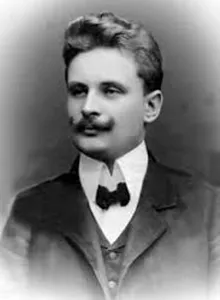
Ukrainian composer, conductor, pianist, musician.
Father of Neonila Bezkorovaina-Stetskiv.
Biography
Vasyl Bezkorovainyi was born on January 12, 1880 in Ternopil. He studied at the Ternopil Ukrainian Gymnasium and the Teacher's Seminary, and sang in the church choir.
He united his friends in a gymnasium bowed orchestra.
Later, Vasyl Bezkorovainyi studied in Lviv at the Polytechnic and Conservatory at the same time. His teachers were professors S. Neviadomsky and M. Soltys.
The hard work undermined Vasyl's health, and he was forced to take a break for several years for treatment in Abak on the Adriatic Sea, and then in the Hutsul region. Upon his return, he continued his studies at the Faculty of Philology at Lviv University. Then for two years he worked at an academic gymnasium and at the Higher Music Institute in Lviv. He was transferred to Novyi Torg in the Lemkivshchyna region and stayed there for three years. Later he taught in Stanislaviv, where he organized and conducted the Boyan Choir and founded the Music School.
In 1912, Bezkorovainyi moved to Ternopil, where he became a teacher at a Ukrainian gymnasium and the conductor of the local Boyan Choir. In 1919, when the Polish army occupied the city, he was arrested and imprisoned in Stalkiv near Kalish. After returning to Ternopil, he organized a branch of the Lviv Higher Music Institute and an orchestra in the Boyan. When national relations in Poland deteriorated, Bezkorovainyi was transferred to Zolochiv and fired there. Having no other duties, he took up organizational work: he founded a branch of the Music Institute, a bow and brass band, and a drama club. In 1935, he returned to Ternopil. Here he composed "My Thoughts" - a tenor part accompanied by an orchestra, three sonatas, two nocturnes, orchestration of the operetta "Natalka Poltavka", music for the play "Mina Mazailo" by M. Kulish. by M. Kulish. He had already published 56 works, and had about 30 more in manuscripts.
Life in exile
In 1944, he left for Austria with the Lviv Opera House (where his wife worked). In exile, he turned to religious motifs and wrote works for violin and piano. Since 1948 he lived in Buffalo (USA). He directed a Ukrainian choir, taught piano, arranged for concerts, and wrote compositions. His "Ukrainian Christmas Overture" was highly praised by the public and press reviewers, and was first performed by the symphony orchestra at a concert in November 1956.
Vasyl Bezkorovainyi died on March 5, 1966.
Creative heritage
Vasyl Bezkorovainyi left a rich musical heritage:
for symphony orchestra - "Ukrainian Christmas Overture" (1956), "Thought-Shumka", "For Consolation";
piano pieces - "Memories from the Mountains" (1911), "Chrysanthemums" (1911-1913), "In a Green Grove", "Song Without Words" (both 1912), "Lullaby Song" (1919);
for violin - "Ukrainian Rhapsody";
for the zither - "A Bundle of Folk Songs", "For Consolation" (1911);
for tanka - "Hutsulka", "Kozachok", "Nezabuka", "Plastunka";
for cello and piano - "Oh, Frost, Frosty," "Over the River Bend," "Oh Come Down, Come Down."
choirs - "Polubotok", "My Thoughts", "Cherry Orchard..." (all based on Taras Shevchenko's lyrics), "Hey, Who Has a Better Fate in the World" (lyrics by Ivan Franko);
children's fairy tale-opera "Little Red Riding Hood" (1960, libretto by L. Poltava);
vaudeville "The Frogs" (co-authored with Volodymyr Baltarovych);
psalms, songs based on the words of Ukrainian poets and his own;
carols, dances;
arrangements of folk songs;
music for performances - Topol by H. Luzhnytsky based on Taras Shevchenko (1938), Mina Mazailo by Mykola Kulish (1942).
V. Bezkorovainyi's compositional work is close to the direction of folklore. He relied on the later layers of song and dance urban music, closely related to the traditions and genres of household music, in particular, close to his salon samples. He is the author of more than 350 works of various genres (many published at his own expense in Lviv in the 1920s and 30s), which were performed in Australia, Canada, the United States, until the early 1940s, and since 1997 in Ukraine, including at the Kyiv Music Fest (2001, Kyiv), the International Bluebird Festival (2004, Simferopol).

